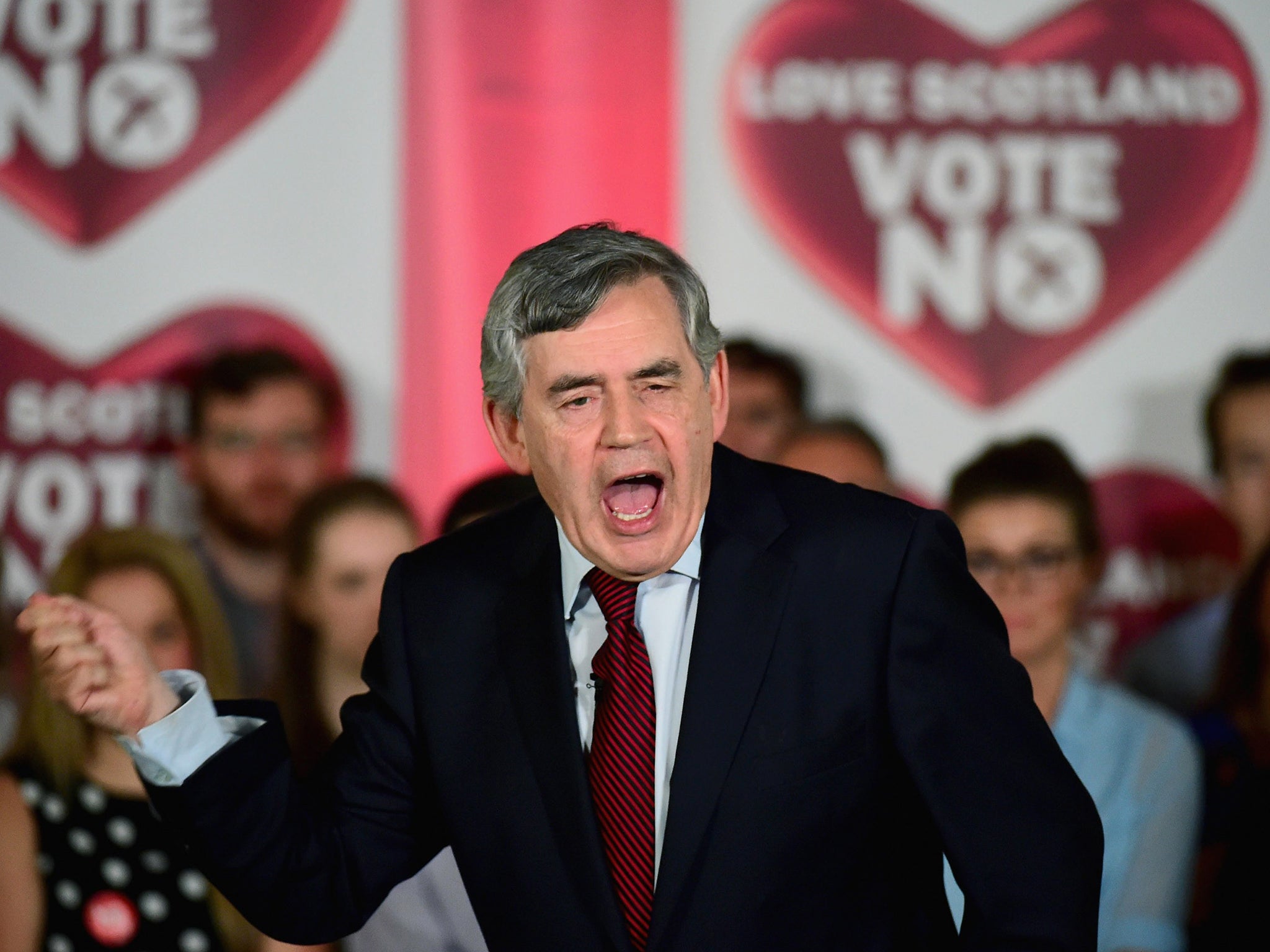Scottish independence - the NO camp: Gordon Brown’s last-gasp eulogy is an apology of biblical proportions
The former PM rediscovers his neglected fiefdom – and his passion

The skirl of bagpipes, tartan kilts, the odd Saltire waved in the air, the audience clapping as though they were at a boisterous Highland ceilidh. All the expected elements of a hard-line gathering to celebrate Scotland’s imminent exit from the Union were there. Apart from one. Gordon Brown, who now effectively leads the fight against Alex Salmond, almost aggressively reminded the cheering audience in Glasgow’s Maryhill that “It is not less patriotic to vote No; Scotland does not belong to the SNP.”
Brown’s controlled rage, the dynamism and the power that marked him out a generation ago as the intellectual young Labour firebrand who might go all the way, is now the driving force behind the No camp. He is responsible for the late change of tactics that were almost deployed in panic after the first poll two week ago which put the separatists ahead.
Comfortably ahead in the polls for almost two years, pro-Union campaigners complacently watched Scotland’s First Minister quietly take first the flag of St Andrews, and then ruthlessly the notion that voting Yes was a patriotic duty.
In the final days of campaigning, Brown, like a retired military general called back for a critical tour of duty, has laid siege to Castle Salmond and tried to rip back the Saltire and the tunes of patriotism from the battlements of Holyrood.
In Maryhill, using the gravel-edged tone of a shipyard shop steward or a Red Clydeside radical, he shouted “This is everyone’s flag, everyone’s country.”
Brown is a son of the manse, whose language, when needed, is more Church of Scotland minister than cabinet minister. And no longer bogged down with baggage of party politics, back-bench squabbles, or focus groups, his rhetoric flows like a brimstone-laden psalm.
The right to work, the NHS, the welfare state, the commitment to international aid; Brown mentioned them all, and added “these were not forged outside the Union, but inside the Union, and none of us are any less Scots as a result".
Brown has become the minister, priest and prophet of anger that his faith in Scotland, is being questioned. “Scotland’s doesn’t belong to me. It doesn’t belong to John Swinney [Holyrood’s SNP finance minister]. It belongs to all of us.”
In the largely negative you-can’t-do-that political messages that characterised month after month of BetterTogether campaigning, the patriotic emotional appeal became the domain of Mr Salmond and the nationalist army.
Now the former PM has flipped, challenged and tried to effectively stuff an absent question back on the ballot paper. David Cameron didn’t think or believe Scotland wanted to go, so didn’t think it worth asking if enhanced devolution would appeal. The question that will be answered within 36 hours – does Scotland think any of late promises won by Brown will be believed?
Gordon Brown, now 63, doesn’t think the country of his birth wants to go. “This vote isn’t about a Scottish parliament – we have that. It isn’t about a shared currency – we have that already. The nationalists' aim is to break every constitutional link with the UK – and we will not have that. We are a nation, yesterday, today and tomorrow.”
Alistair Darling, still nominally head of the all-party pro-Union campaign, promised the audience that an enhanced, more powerful Scottish parliament would follow a No vote. But 100 days ago, when a similar campaign rally was held in the same venue, that promise was absent. Now, after Brown’s intervention won the attention of a rudderless Westminster waking up to the possibility that Scotland was on the verge of ripping the union apart, Darling was able to lay a “stronger Scottish parliament, delivered sooner and safer than years of wrangling and instability” firmly at the feet of Scotland’s voters.
Carefully picked No supporters who spoke before Brown arrived told their own stories. A trainee dental surgeon spoke of the NHS saving her mother, and saying: “I wouldn’t be here if it wasn’t for the lies about the NHS being told by the SNP.” That received as big a cheer as any Brown mustered.
If Scotland stays in the union, if the tight polls swing in No's favour, there is an argument that points to Brown as the unexpected late-arriving saviour of a still-United Kingdom. Which is ironic – because if there one man who largely ignored the fiefdom he ruled over north of border as his power grew in London, then that man is Gordon Brown. And Scotland may just be watching the largest and most important apology it has heard in the last 307 years.
Join our commenting forum
Join thought-provoking conversations, follow other Independent readers and see their replies
Comments
Bookmark popover
Removed from bookmarks